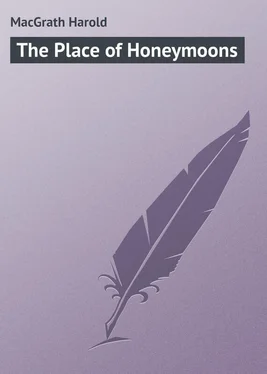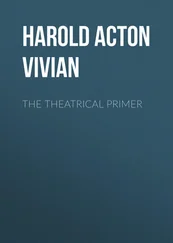Harold MacGrath - The Place of Honeymoons
Здесь есть возможность читать онлайн «Harold MacGrath - The Place of Honeymoons» — ознакомительный отрывок электронной книги совершенно бесплатно, а после прочтения отрывка купить полную версию. В некоторых случаях можно слушать аудио, скачать через торрент в формате fb2 и присутствует краткое содержание. Жанр: foreign_language, foreign_prose, на английском языке. Описание произведения, (предисловие) а так же отзывы посетителей доступны на портале библиотеки ЛибКат.
- Название:The Place of Honeymoons
- Автор:
- Жанр:
- Год:неизвестен
- ISBN:нет данных
- Рейтинг книги:5 / 5. Голосов: 1
-
Избранное:Добавить в избранное
- Отзывы:
-
Ваша оценка:
- 100
- 1
- 2
- 3
- 4
- 5
The Place of Honeymoons: краткое содержание, описание и аннотация
Предлагаем к чтению аннотацию, описание, краткое содержание или предисловие (зависит от того, что написал сам автор книги «The Place of Honeymoons»). Если вы не нашли необходимую информацию о книге — напишите в комментариях, мы постараемся отыскать её.
The Place of Honeymoons — читать онлайн ознакомительный отрывок
Ниже представлен текст книги, разбитый по страницам. Система сохранения места последней прочитанной страницы, позволяет с удобством читать онлайн бесплатно книгу «The Place of Honeymoons», без необходимости каждый раз заново искать на чём Вы остановились. Поставьте закладку, и сможете в любой момент перейти на страницу, на которой закончили чтение.
Интервал:
Закладка:
But, like the villain in the play, his income still pursued him. Certain scandals inevitably followed, scandals he was the last to hear about and the last to deny when he heard them. Many persons, not being able to take into the mind and analyze a character like Courtlandt’s, sought the line of least resistance for their understanding, and built some precious exploits which included dusky island-princesses, diaphanous dancers, and comic-opera stars.
Simply, he was without direction; a thousand goals surrounded him and none burned with that brightness which draws a man toward his destiny: until one day. Personally, he possessed graces of form and feature, and was keener mentally than most young men who inherit great fortunes and distinguished names.
Automobiles of all kinds panted hither and thither. An occasional smart coupé went by as if to prove that prancing horses were still necessary to the dignity of the old aristocracy. Courtlandt made up his mind suddenly. He laughed with bitterness. He knew now that to loiter near the stage entrance had been his real purpose all along, and persistent lying to himself had not prevailed. In due time he took his stand among the gilded youth who were not privileged (like their more prosperous elders) to wait outside the dressing-rooms for their particular ballerina. By and by there was a little respectful commotion. Courtlandt’s hand went instinctively to his collar, not to ascertain if it were properly adjusted, but rather to relieve the sudden pressure. He was enraged at his weakness. He wanted to turn away, but he could not.
A woman issued forth, muffled in silks and light furs. She was followed by another, quite possibly her maid. One may observe very well at times from the corner of the eye; that is, objects at which one is not looking come within the range of vision. The woman paused, her foot upon the step of the modest limousine. She whispered something hurriedly into her companion’s ear, something evidently to the puzzlement of the latter, who looked around irresolutely. She obeyed, however, and retreated to the stage entrance. A man, quite as tall as Courtlandt, his face shaded carefully, intentionally perhaps, by one of those soft Bavarian hats that are worn successfully only by Germans, stepped out of the gathering to proffer his assistance. Courtlandt pushed him aside calmly, lifted his hat, and smiling ironically, closed the door behind the singer. The step which the other man made toward Courtlandt was unequivocal in its meaning. But even as Courtlandt squared himself to meet the coming outburst, the stranger paused, shrugged his shoulders, turned and made off.
The lady in the limousine – very pale could any have looked closely into her face – was whirled away into the night. Courtlandt did not stir from the curb. The limousine dwindled, once it flashed under a light, and then vanished.
“It is the American,” said one of the waiting dandies.
“The icicle!”
“The volcano, rather, which fools believe extinct.”
“Probably sent back her maid for her Bible. Ah, these Americans; they are very amusing.”
“She was in magnificent voice to-night. I wonder why she never sings Carmen ?”
“Have I not said that she is too cold? What! would you see frost grow upon the toreador’s mustache? And what a name, what a name! Eleonora da Toscana!”
Courtlandt was not in the most amiable condition of mind, and a hint of the ribald would have instantly transformed a passive anger into a blind fury. Thus, a scene hung precariously; but its potentialities became as nothing on the appearance of another woman.
This woman was richly dressed, too richly. Apparently she had trusted her modiste not wisely but too well: there was the strange and unaccountable inherent love of fine feathers and warm colors which is invariably the mute utterance of peasant blood. She was followed by a Russian, huge of body, Jovian of countenance. An expensive car rolled up to the curb. A liveried footman jumped down from beside the chauffeur and opened the door. The diva turned her head this way and that, a thin smile of satisfaction stirring her lips. For Flora Desimone loved the human eye whenever it stared admiration into her own; and she spent half her days setting traps and lures, rather successfully. She and her formidable escort got into the car which immediately went away with a soft purring sound. There was breeding in the engine, anyhow, thought Courtlandt, who longed to put his strong fingers around that luxurious throat which had, but a second gone, passed him so closely.
“We shall never have war with Russia,” said some one; “her dukes love Paris too well.”
Light careless laughter followed this cynical observation. Another time Courtlandt might have smiled. He pushed his way into the passage leading to the dressing-rooms, and followed its windings until he met a human barrier. To his inquiry the answer was abrupt and perfectly clear in its meaning: La Signorina da Toscana had given most emphatic orders not to disclose her address to any one. Monsieur might, if he pleased, make further inquiries of the directors; the answer there would be the same. Presently he found himself gazing down the avenue once more. There were a thousand places to go to, a thousand pleasant things to do; yet he doddered, full of ill-temper, dissatisfaction, and self-contempt. He was weak, damnably weak; and for years he had admired himself, detachedly, as a man of pride. He started forward, neither sensing his direction nor the perfected flavor of his Habana.
Opera singers were truly a race apart. They lived in the world but were not a part of it, and when they died, left only a memory which faded in one generation and became totally forgotten in another. What jealousies, what petty bickerings, what extravagances! With fancy and desire unchecked, what ingenious tricks they used to keep themselves in the public mind, – tricks begot of fickleness and fickleness begetting. And yet, it was a curious phase: their influence was generally found when history untangled for posterity some Gordian knot. In old times they had sung the Marseillaise and danced the carmagnole and indirectly plied the guillotine. And to-day they smashed prime ministers, petty kings, and bankers, and created fashions for the ruin of husbands and fathers of modest means. Devil take them! And Courtlandt flung his cigar into the street.
He halted. The Madeleine was not exactly the goal for a man who had, half an hour before, contemplated a rout at Maxim’s. His glance described a half-circle. There was Durand’s; but Durand’s on opera nights entertained many Americans, and he did not care to meet any of his compatriots to-night. So he turned down the Rue Royale, on the opposite side, and went into the Taverne Royale, where the patrons were not over particular in regard to the laws of fashion, and where certain ladies with light histories sought further adventures to add to their heptamerons. Now, Courtlandt thought neither of the one nor of the other. He desired isolation, safety from intrusion; and here, did he so signify, he could find it. Women gazed up at him and smiled, with interest as much as with invitation. He was brown from long exposure to the wind and the sun, that golden brown which is the gift of the sun-glitter on rocking seas. A traveler is generally indicated by this artistry of the sun, and once noted instantly creates a speculative interest. Even his light brown hair had faded at the temples, and straw-colored was the slender mustache, the ends of which had a cavalier twist. He ignored the lips which smiled and the eyes which invited, and nothing more was necessary. One is not importuned at the Taverne Royale. He sat down at a vacant table and ordered a pint of champagne, drinking hastily rather than thirstily.
Читать дальшеИнтервал:
Закладка:
Похожие книги на «The Place of Honeymoons»
Представляем Вашему вниманию похожие книги на «The Place of Honeymoons» списком для выбора. Мы отобрали схожую по названию и смыслу литературу в надежде предоставить читателям больше вариантов отыскать новые, интересные, ещё непрочитанные произведения.
Обсуждение, отзывы о книге «The Place of Honeymoons» и просто собственные мнения читателей. Оставьте ваши комментарии, напишите, что Вы думаете о произведении, его смысле или главных героях. Укажите что конкретно понравилось, а что нет, и почему Вы так считаете.












